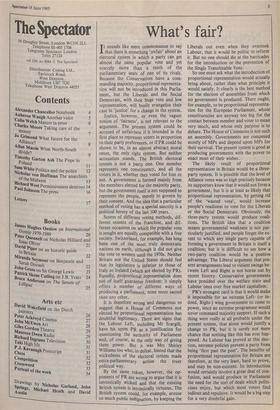What's fair?
t sounds like mere commonsense to say I that there is something 'unfair' about an electoral system in which a party can get almost the same popular vote and yet scarcely more than a tenth of the parliamentary seats of one of its rivals. Because the Conservatives have a com- manding majority, proportional representa- tion will not be introduced in this Parlia- ment, but the Liberals and the Social Democrats, with their huge vote and low representation, will busily evangelise their case in 'justice' for a change in the system.
Justice, however, or even the vaguer notion of 'fairness', is not relevant to the argument. The present system could be accused of unfairness if it intended in the first place to represent voters in proportion to their party preferences, or if PR could be shown to be, in an almost abstract moral sense, the only right system. But neither accusation stands. The British electoral system is not a party one. One member represents one constituency, and all the voters in it, whether they voted for him or not. A government is formed mainly from the members elected for the majority party, but the government itself is not supposed to represent the people, merely to govern by their consent. And the idea that a particular method of voting has a special sanctity is a political heresy of the last 100 years.
Scores of different voting methods, dif- ferent extents of the franchise, and dif- ferent occasions on which the popular vote is sought are equally compatible with a free society. Switzerland, for example, has long been one of the most truly democratic nations on earth, although it did not give the vote to women until the 1970s. Neither Britain nor the United States should feel that its legislature is inferior to those of Italy or Ireland (which are elected by PR). Equally, proportional representation does not of itself guarantee freedom: it simply offers a number of different ways of producing a parliament, none more sacred than any other.
It is therefore wrong and dangerous to suggest that a House of Commons not elected by proportional representation has doubtful legitimacy. There are signs that the Labour Left, including Mr Scargill, have hit upon PR as a justification for questioning the authority of Parliament and, of course, as the only way of giving them power. But it was Mrs Shirley Williams too who, in defeat, hinted that the wickedness of the electoral system made extra-parliamentary action the truer political way.
By the same token, however, the op- ponents of PR are wrong to argue that it is intrinsically wicked and that the existing British system is intrinsically virtuous. The British system could, for example, arouse so much public indignation, by keeping the
Liberals out even when they overtook Labour, that it would be politic to reform it. But no one should die at the barricades for the introduction or the prevention of the Single Transferable Vote. So one must ask what the introduction of proportional representation would actually bring about, rather than what principle it would satisfy. It clearly is the best method for the election of assemblies from which no government is produced. There ought, for example, to be proportional representa- tion for the European Parliament, whose constituencies are anyway too big for the contact between member and voter to mean very much, and whose only purpose is to debate. The House of Commons is not such an assembly. Governments are composed mostly of MPs and depend upon MPs for their survival. The present system is good at producing governments with the power to enact most of their wishes.
The likely result of proportional representation in Britain would be a three- party system. It is possible that the level of Alliance votes was so high precisely because its supporters knew that it would not form a government, but it is at least as likely that proportional representation, by getting rid of the `wasted vote', would increase people's readiness to vote for the Liberals or the Social Democrats. Obviously, the three-party system would produce coali- tions. The British idea that a coalition means governmental weakness is not par- ticularly justified, and people forget the ex- tent to which any single party capable of forming a government in Britain is itself a coalition; but it is difficult to see how a two-party coalition would be a positive advantage. The Liberal argument that pre- sent arrangements lead to violent swings be- tween Left and Right is not borne out by recent history. Conservative governments have presided over the welfare state and Labour ones over free market capitalism.
PR's strongest card is that it would make it impossible for an extreme Left- (or in- deed, Right-) wing government to come to power, since an extreme programme would never command majority support. If such a thing were really at all probable under the present system, that alone would justify a change to PR, but it is surely not mere chance that nothing like this has ever hap- pened. As Labour has proved at this elec- tion, extreme policies prevent a party from being `first past the post'. The benefits of proportional representation for Britain are therefore, at the very least, hard to prove, and may be non-existent. Its introduction would certainly involve a great deal of con- fusion, and would produce in Parliament the need for the sort of deals which politi- cians enjoy, but which most voters find tedious and repulsive. It would be a big step for a very doubtful gain.






































 Previous page
Previous page